
by Cynthia Petrigh | May 22, 2017
Beyond peace supports mediation and peace processes, through
- Conducting conflict analyses with recommendations on entry points for peacebuilding and humanitarian access
- Building trust and fostering meaningful dialogue across diverse stakeholder groups
- Supporting drivers of positive change including women’s participation.
In the past four years, we were deployed as peace and devlopment advisor (PDA) for the United Nations in Guinea and Nepal, where we contributed to:
- The sound analysis of complex situations by providing conflict analysis and strategic advice on risk and resilience as well as geopolitical dimensions, to UN top officials (SRSG, Resident Coordinator, UN Country Team, DPPA
- The identification of opportunities to build national capacities for conflict prevention including areas of strategic programmatic and policy engagement with national stakeholders, in areas of conflict prevention, peacebuilding, national reconciliation, Women, Peace and Security (WPS) and Youth, Peace and Security (YPS)
- Grounding our peace work in culture through the development of “Peace through Cutlure” and ‘Dialogues Under the Kapok Tree” programmes.
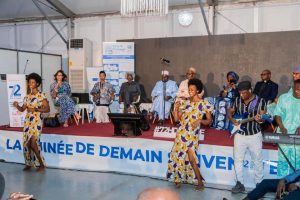 §§§
§§§
Trained in conflict resolution, Beyond peace Founder has worked in direct support of Track I talks (as a member of the International Contact Group for the peace talks on Mindanao) and in numerous other dialogue processes and support to transitions and to civil society and women’s groups, such as the National Dialogue in Yemen. Today at Beyond peace she continues this support work to conflict affected countries and societies in transition.
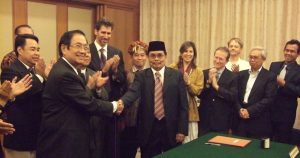
——-
On behalf of NGO Concern Worldwide, Beyond peace Cynthia Petrigh and Arsène Gassi conducted a field research in 3 provinces of the Central African Republic (CAR) in February 2018, in order to better understand conflict and gender dynamics in these regions as well as how communities cope with disaster.
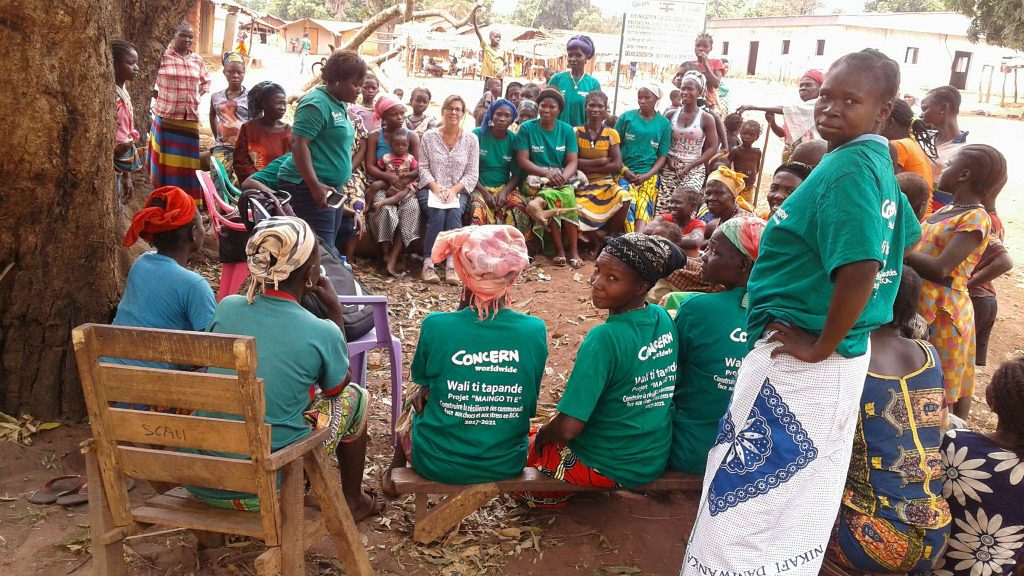
After surveying the 3 sous-Préfectures in Ombella M’poko and Lobaye, we ran a strategic workshop for the NGO expatriate and national staff and produced a contextual analysis, a strategy document and programmatic recommendations in view of integrating Gender, Peacebuilding and DRR.
Unsurprisingly, in the surveyed provinces as in other parts of the conflict affected country, poverty, sever gender inequalities, conflict, poor access to education as well as the inconducive mining environment were found to be hampering communities’ development. At the same time, these communities experience a relative level of calm, or negative peace. While this is mainly due to the current control by one armed group only, it can provide the space for a transformative intervention. The question of the return of the Muslims inhabitants is still pending, as are the prospects for women’s participation.
We wish Concern team full success in their 5-year programme aiming at enhancing communities resilience to disasters and conflict and fighting gender-based violence. This ambitious project complements other interventions in the region (WASH, Food for work, etc). The agency is well-placed to successfully implement this project, which could become a model for other regions in CAR.
—
In October 2017, we participated on behalf of the Organisation for Security and Cooperation in Europe (OSCE) and in collaboration with the Toledo international Centre for Peace (CiTPAX) and the Spanish MOFA, in the training: “Mediation and conflict resolution from a gender perspective” for women from Albania, Bosnia, Egypt, France, Israel, Italy, Jordan, Lebanon, Libya, Spain and Tunisia and involved in mediation efforts in their countries.
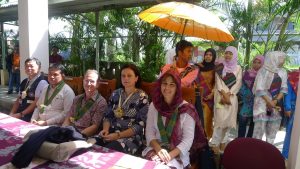
At the invitation of People’s College in Patani, Thailand, we conducted a 4-day visit in the Deep South in December 2016 in order to meet with civil society, academics and security sector involved in the peace efforts for the region. The highlight of the visit was the Conference held at Prince of Songkla University on the theme of Monitoring, which focused on the comparative case study of Mindanao, Philippines. We would like to express our gratitude to People’s College and all the personalities met for their excellent hospitality and for the quality of the conversations we had.
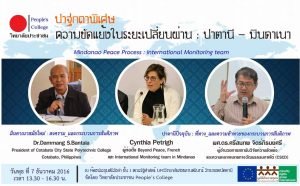
At the invitation of the UNSSC, Cynthia Petrigh from Beyond peace co-facilitated a training workshop on conflict analysis for the UN Support Mission in Libya (UNSMIL) in April 2016 and another training workshop on conflict analysis for the UN Multidimensional Integrated Stabilization Mission in Mali (MINUSMA) in May. Participants were introduced to the main conflict analysis tools, and used them to reflect on some of the root causes of the conflicts they are confronted with, the different peace and security actors as well as the opportunities for peace in both situations.
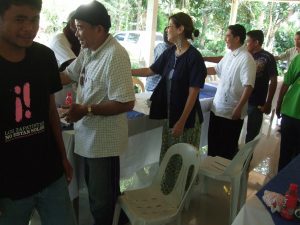
Beyond peace was contacted by Burkina Faso’s “Balai Citoyen” for support in organizing the nonviolent transition from Blaise Compaoré’s regime to a democratic one. A specific request was expressed for training on international norms and standards, for CSOs and the security sector. While studying partnerships and funding possibilities we are accompanying this group in its democratic transition.
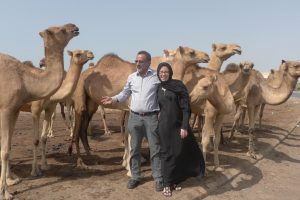
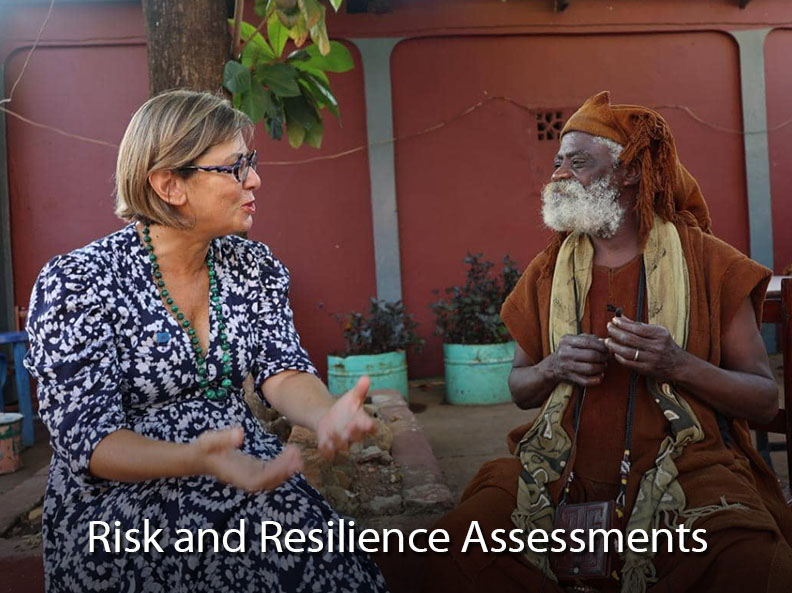
by Cynthia Petrigh | May 21, 2017
Risk and resilience assessments
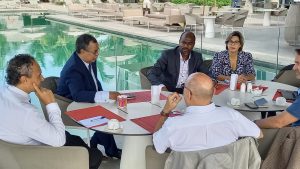
Beyond peace has extensive experience conducting risk and resilience assessments, including in Africa, Asia and the Middle-East, where we have been working with the UN, INGOs and the UK government.
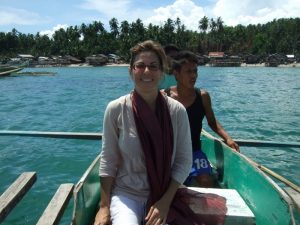
During these assignments our analysis revealed key emerging patterns, enabling us to develop targeted risk mitigation strategies and empower local change-makers.
Our approach involves :
– Understanding the drivers of fragility and resilience
– Conducting comprehensive and gendered stakeholder mappings
– Using multi-disciplinary methodologies including key informants interviews, desk reviews, and field in-person observation
– Delivering tailored assessments reports with recommendations on entry points for diplomatic action and peacebuilding.
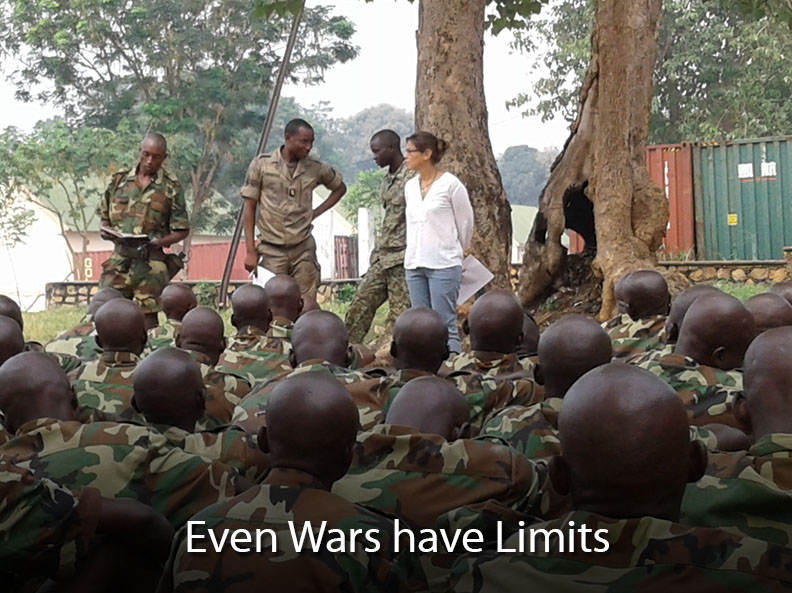
by Cynthia Petrigh | May 20, 2017
Beyond peace specializes in training armed forces and non-state armed groups on the Law of armed conflict (LOAC), the prevention of sexual violence (PSV) to ensure their their behavior, their efficacy and their reputationand meets standards of excellence and complies with international norms.
Our expertise and our added-value in this field, comes from:
- rapid and in-depth assessment of legal, operational and cultural context and applicable law
- production of customised training curriculum adapted to operational environment, specialties and ranks
- close collaboration with military commanders and trainers
- comprehensive methodology: lectures, questions/answers sessions, group work, digital and interactive platforms, dialogue and exchanges. The rules learnt through this interactive methodology are then practiced during combined tactical exercises (table-top and on the ground)
- monitoring and evaluation of progress
- train the trainer programme to ensure sustainability
Our clients include: UK MoD, EUTMs, Peacekeeping institutions (Malaysia peacekeeping centre, MINUSMA, Vietnam peacekeeping department) as well as non-state armed groups (Moro islamic Liberation Front in the Philippines).
Below are some stories.
We have just completed a 6-month pilot project in Central Africa, aiming at training the Central African Armed forces (FACA) on International humanitarian law (IHL) and prevention of sexual violence. The project was implemented through a partnership with the EU training mission (EUTM) in CAR with the support of UK government.
We were able to successfully design and establish the component. We have trained some 900 personnel: 1 infantry battalion, Officers on Leadership courses, NCOs, specialised staff (platoon Commander course; Intel course; CAT 2 course); former insurgents and instructors.
Our training is based on a contextual analysis and it is tailored to the audience and to the operational, legal and cultural context. It utilises a comprehensive methodology:
Below are some of the stories and the people behind this training project.
- Infantry Battalion
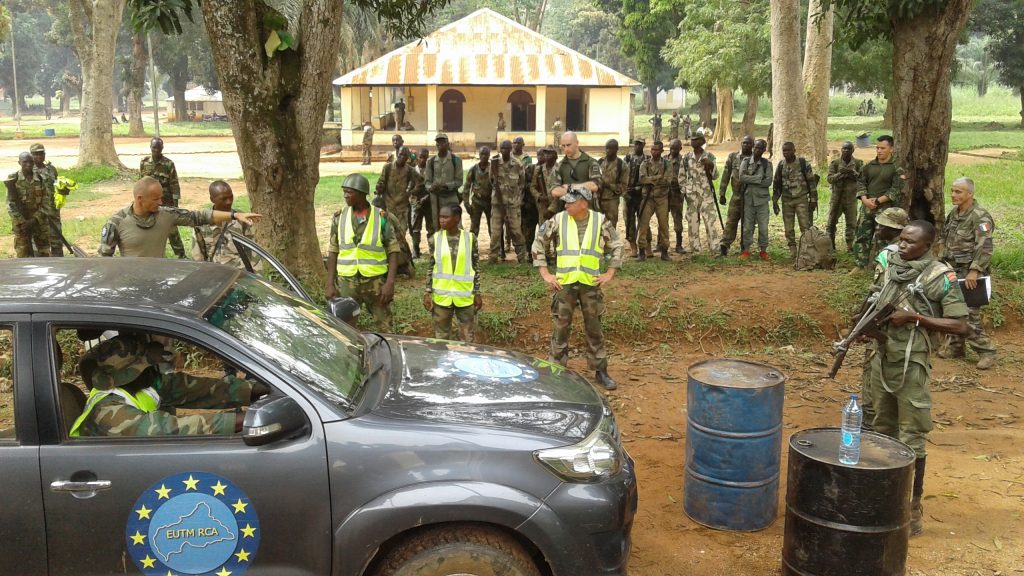 Photo: joint checkpoint exercise where the FACA learn about securing and respecting human rights
Photo: joint checkpoint exercise where the FACA learn about securing and respecting human rights
We have trained the 2 Companies of Infantry Battalion 1, currently trained by the EUTM. In addition to classroom sessions, group work and “sandbox” exercises, we were able to introduce a new tool through joint, IHL-military tactical exercises. All four Companies of BIT 1 participated in the exercise. We held briefing sessions with the Battalion Officers and the General Staff.
At the question “what did you learn from this training?”, a Corporal answers: “we are learning the difference between a professional military and bandits”.
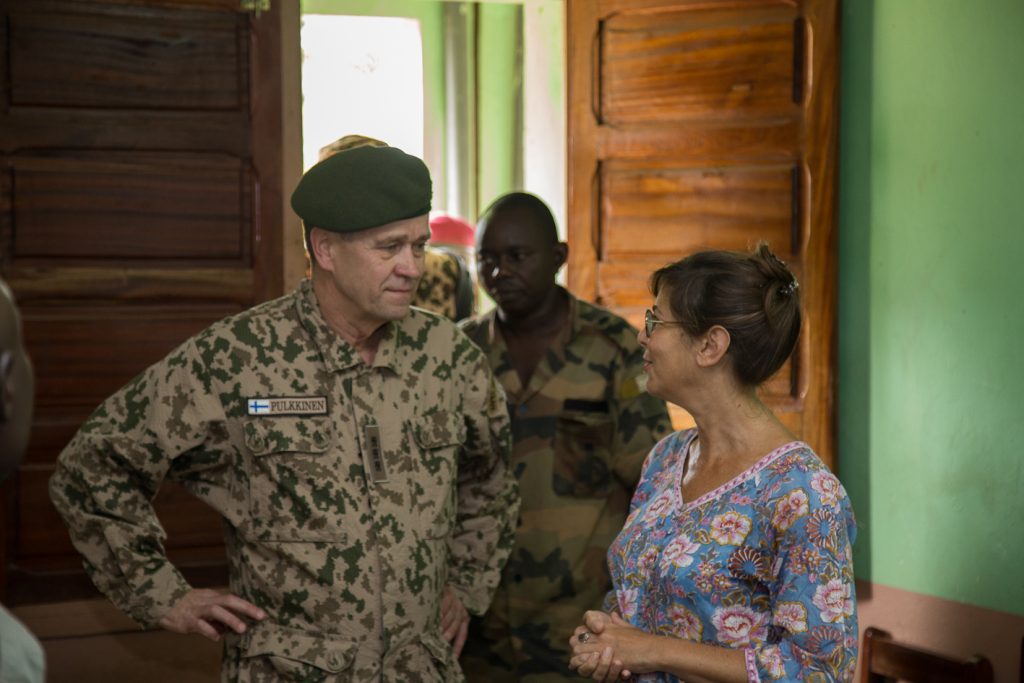
Photo: MPCC Director LGen Pulkkinen visits our class in Camp Kasai
“Your tactical exercises are adapted to our realities. You know our dilemmas and you are really here to support us”, says a Sergeant.
2. The former insurgents
Beyond peace contributed to the training of 100 former insurgents who have joined the Central African Armed forces (FACA) as part of the Demobilization, Disarmament, Rehabilitation and Repatriation (DDRR) project. The President’s initiative, which was joined by the armed groups and endorsed by the international community, provides a sign of hope and dialogue across the conflict divide.
We worked first, in October, with the 10 Officers and NCOs in charge of supervising the new recruits. In November, we started training the team of 100, with their support.
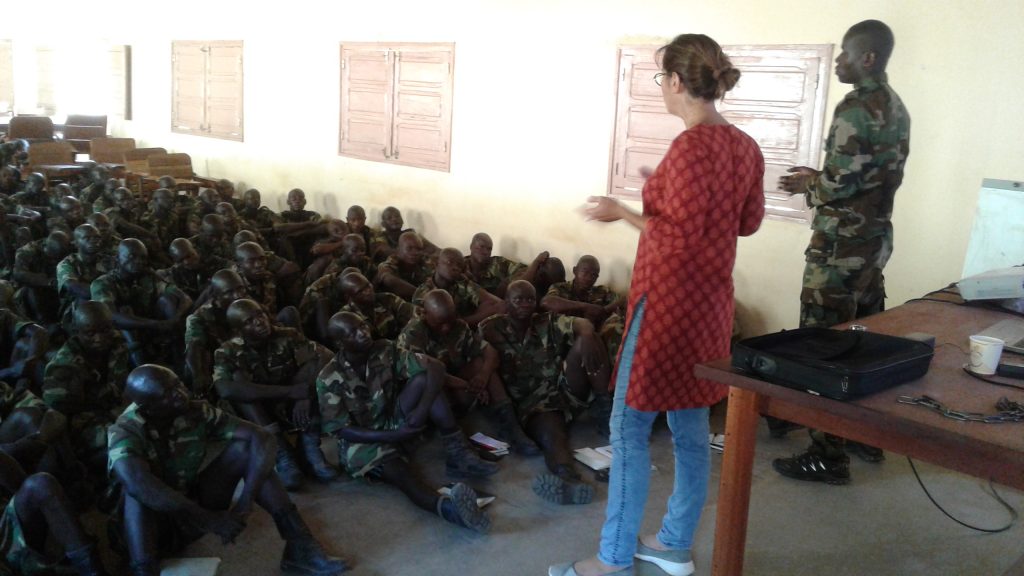
Photo: Movie session with the 100 DDRR former insurgents, December 2017
The former insurgents come form various rebel groups; they belong to different religious backgrounds; about 10% are female. They display an incredible willingness to learn and to amend their lives. This morning, I was showing videos about conflict-related sexual violence, in CAR and in other countries. One of them raised their hand: “We have our share in what happened, he said. But now that we are being educated and we understand our duties, we will not do it anymore. We will protect women against this crime. We will report abuse.”
As for the other members of the armed forces, the course looks at the basic principles of IHL (such as: distinction, proportionality, precaution); the protected persons and sites; the need to protect and respect women; the prohibition of torture, arson, pillage, rape; the treatment of prisoners; the roles of duties of military and criminal and military sanction processes.
3. Educating Officers
We contributed to the 2 Leadership training courses organised this semester by the Central African MOD in partnership with the EUTM. Some 65 Lieutenants educated abroad benefitted from these courses and learnt and shared about their duties and responsibilities as FACA. “We learnt that we cannot rape. We never knew that”, said one of the Officers.
“We learnt that when an operation is likely to result in failure and in a massacre, we should postpone it and better prepare it”, said another Lieutenant. “I had never thought of that. We are learning”.
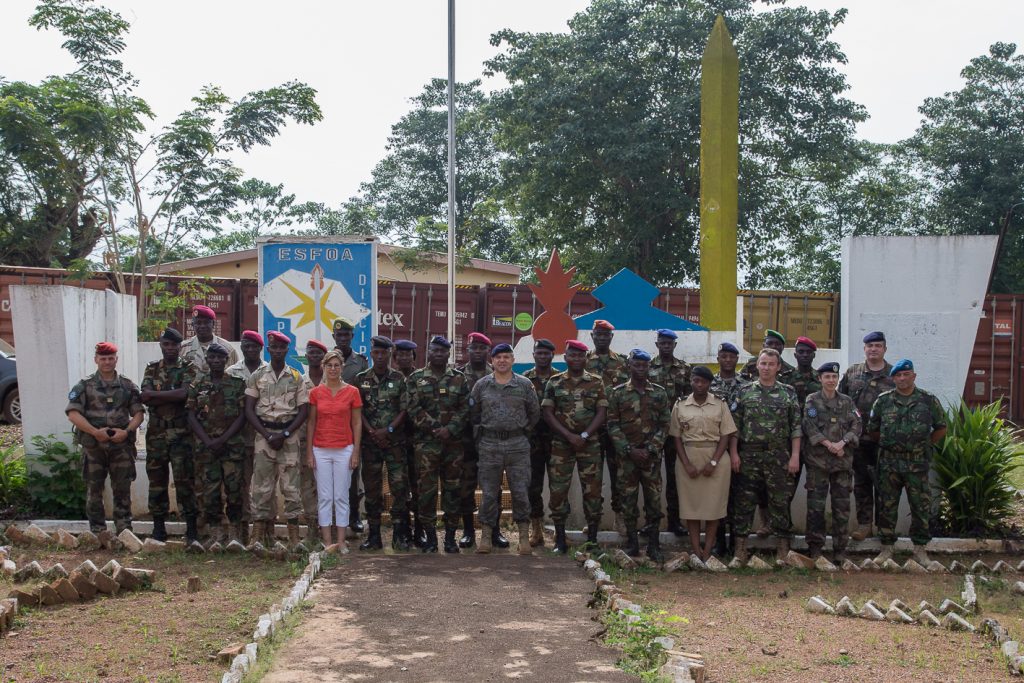
Group photo for the Graduation of 2nd Leadership course for Officers, November 2017
4. Platoon Commanders’ Course
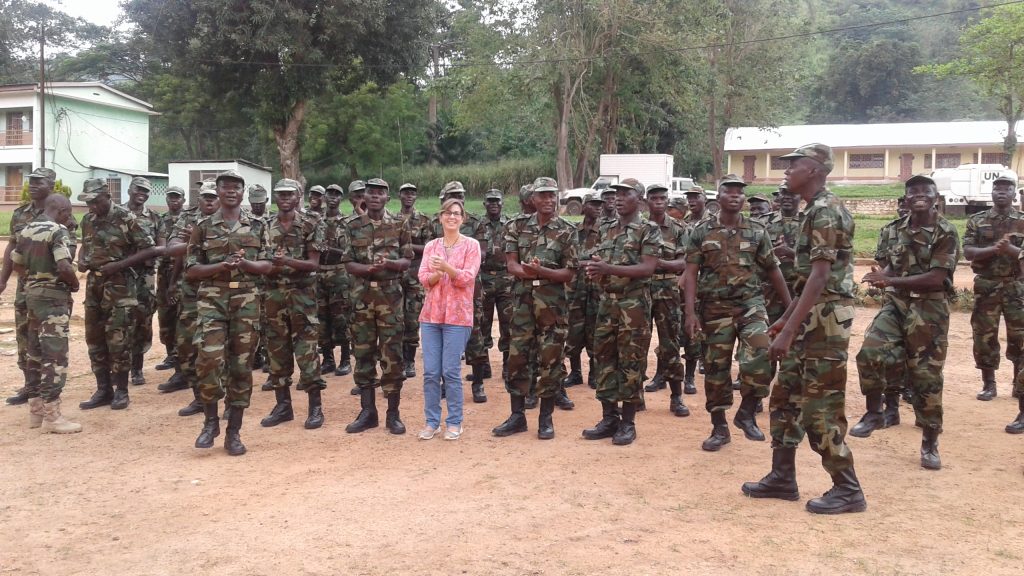
Photo: BA2 Platoon Commander course participants receive their uniform shoulder loops
We co-facilitated this 12-week course together with Lieutenant Zandanga from the FACA. It was a wonderful experience and a privilege to work along such a skilled and committed instructor.
“We love this course because of its unique methodology. We learnt a lot and it’s fun”, said one participant.
5. Train the trainers
As much as this pilot project is successful, it has its limitations because it is a private initiative, limited in time. In order to ensure some degree of sustainability to our project, and in recognition of the great capacities and cooperation from the Central African military, we have trained 8 new IHL/PSV instructors. We benefitted from the outstanding support from UN OCHA and from the FACA through Lieutenant Zandanga for this activity.
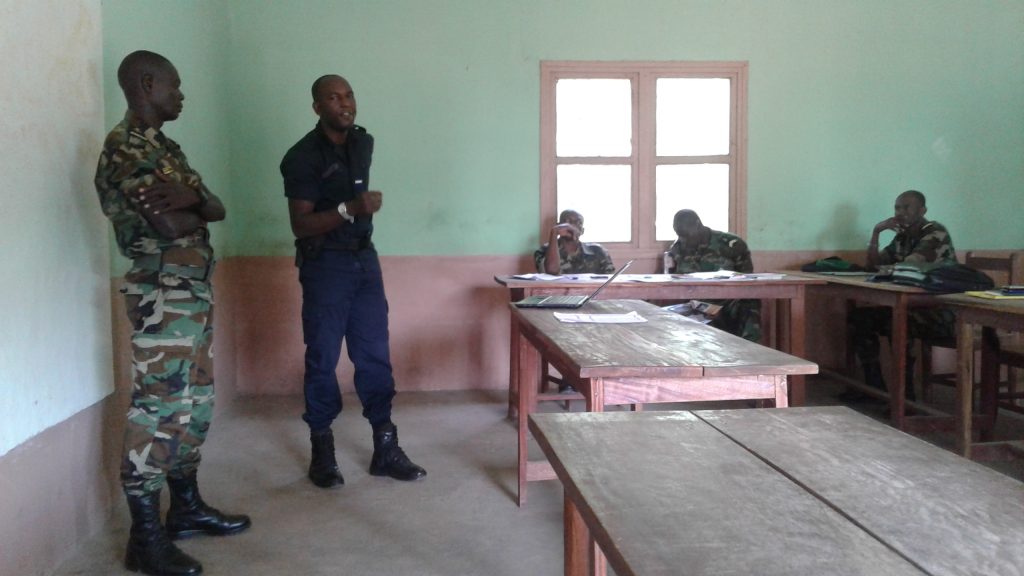
Photo: Lieutenants Dikossou and Lapo delivering a training on Protection of women and prevention of sexual violence: “women are the pillars of society; we, military, have to protect them”.
We can certify that these instructors are competent and committed and we wish them all the best in their new assignments as instructors.
6. What next?
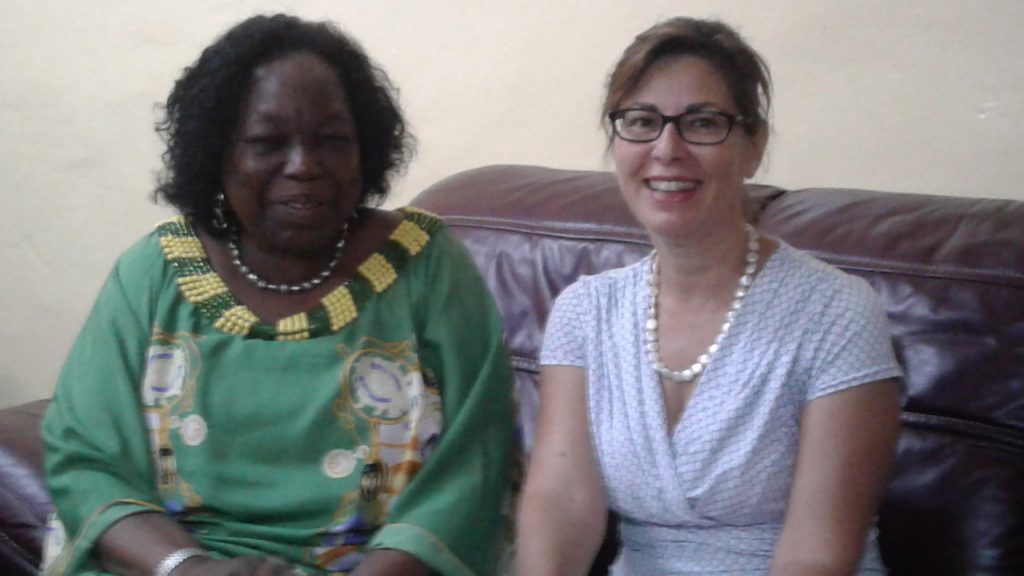
The Minister of Defense granted us two private audiences and in December expressed the wish that Beyond peace continues training the FACA. “Our military need to improve their behaviour before they are deployed. What you bare doing is essential and successful.”
We were privileged to receive wonderful support from the highest authorities and excellent cooperation from the FACA. The President of National Assembly received us on 21 December and also extended his support: “I congratulate you. You are an experienced woman. Your approach is the best we can have in this situation. Without ethics, we train brutes”.
The pilot project is a success. It was designed and managed by Beyond peace, thanks to the endorsement from the highest CAR authorities and support from the UK Government. What would be needed to systematise this component in EU CSDP missions? We will be holding a series of meetings in 2018 in order to share ideas and findings to this effect. Contact us to find out more or to participate: cynthia.petrigh@gmail.com
***
Beyond peace works regularly with the UK armed forces as a Gender adviser. Our work includes:
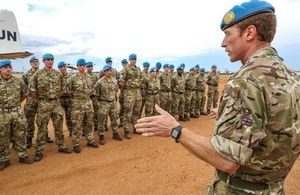
- Advising on gender mainstreaming and implementation of the Women, Peace and Security agenda, on which the UK is leading;
- Teaching and training at Srivenham military academy (since 2016) and in the Understanding and Working with the Military training (for UK civil servants)
- Participating in military exercises and mission rehearsal exercises for deploying troops: UK Joint Horizon, OP Trenton (deploying to South Sudan UNMISS)
***
San remo IIHL / US Africom
Beyond peace works with the US Africa Command on accountability for Commanders of African units deployed to UN peacekeeping missions. We participated in the African accountability workshops organised by the US Africom and the San remo Institute of International law in 2014 and 2016.
Beyond peace contributes to the work of the San remo Institute of humanitarian law (IIHL). In addition to her role as the former Director of the Refugee Law Course, Founder Cynthia Petrigh, who is a member of the Institute, is regularly invited to participate in reflection and debates, such as the San remo annual Round-Table on current issues of IHL.
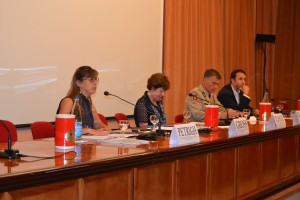
***
Training the Malian armed forces (FAMA) at EUTM Mali
“We understood the difference between a professional Army and a group of bandits” – a soldier
Beyond peace Cynthia Petrigh designed and implemented the IHL/human rights/PSV training package for the EUTM mission in Mali. We trained 2,700 troops and officers during this UK seconded deployment which took place from June 2013 to June 2014. During this time, we developed lectures, drills, evaluations, as well as training for the European training officers, for increased cohesion, effectiveness and multiplying effect.
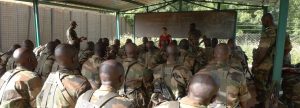
Challenges facing the FAMA (such as dealing with civilian riots; handling vulnerable persons at checkpoints; behaving in a professional manner in a context of fear and revenge) were integrated in the tactical exercises with the cooperation of the EU military trainers.
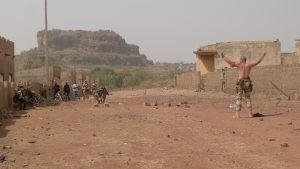
Dissemination
The Malian experience was shared with a number of specialized audiences. We were invited by the Swedish armed forces and the Nordic Centre for Gender in the Military to share our experience and findings, in September 2014, ahead of the deployment of Swedish troops to MINUSMA. A hearing was organised at Whitehall for the different Government agencies to discuss the IHL/PSV training of the FAMA program and its policy implications.
In The Hague, meetings were organised by GPPA with civil society as well as with the Swedish armed forces, who are deploying troops to the MINUSMA. In Belgrade,
We edited and published a training manual based on our experience in Mali with the EUTM. This manual explains the methodology which was developed specifically for the Malian troops and which was used to train more than 3,000 troops. The manual is available for free download on this website.
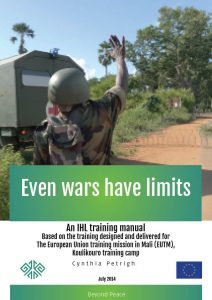
***
Working with non-state armed groups (NSAG)
We have been working with the Moro Islamic Liberation Front (MILF) in different capacities for several years.
While our Founder Cynthia Petrigh worked closely with the MILF negotiating panel in her role as a member of the international Contact Group for the peace talks on Mindanao (ICG) in 2009-2010 and with the Bangsamoro Islamic Armed Forces (BIAF) and their Ceasefire component during her tour as the Head of IHL/Human rights component of the ceasefire monitoring mission in 2011-2012, we continued our engagement with the MILF.
Beyond peace conducted a mission to Mindanao in February 2016 to meet with the political and military leadership of the Moro Islamic Liberation Front (MILF). We discussed with the MILF training needs for the Bangsamoro Islamic Armed forces (BIAF) in the context of the transformation.
In 2015, we visited Mindanao on behalf of a short mission with Swiss NGO Geneva Call to bring support on the content and the methodology of workshops with the Moro Islamic Liberation Front (MILF) on the prohibition sexual violence.
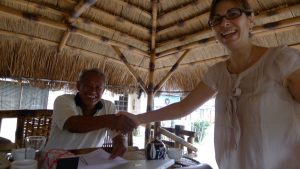
Beyond peace conducts confidential work with other NSAG in Asia and in Africa on compliance, ceasefire monitoring and support to mediation processes.
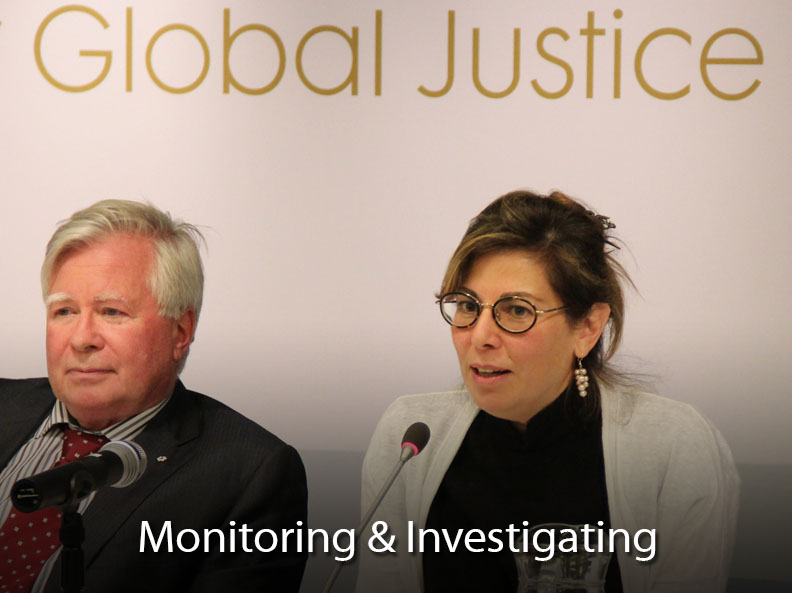
by Cynthia Petrigh | May 19, 2017
Beyond peace Founder’s past work with Commissions of Investigation (Kyrgyzstan Independent Commission of Inquiry) and human rights monitoring (International Monitoring team – IMT, Mindanao’s ceasefire monitoring mission) as well as years of experience working with victims (as Executive director for the Centre Nassim for the victims of torture) and perpetrators has allowed her to join leading reflection on the state of the profession and on best practice.
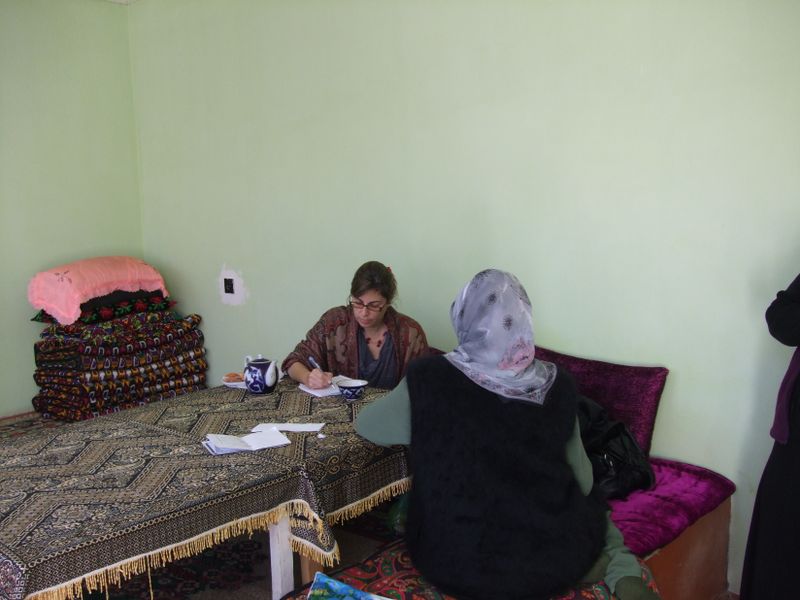
In an article made public in 2014 on the Protection of Witnesses, Victims and Staff in Monitoring, Reporting, and Fact-Finding Mechanisms (https://papers.ssrn.com/sol3/Papers.cfm?abstract_id=2392493), she examines the sources of the obligations to protect and the nature of the threats that could arise for witnesses, victims and staff. She looks at the measures that can be applied by MRF professionals and analyses how past MRF missions, whether commissioned by ad hoc bodies or by the UN, have grappled with these risks and taken – or not – protective steps.
This paper formed one of the basic documents utilized by the Harvard Group of Professionals on Monitoring, Fact-Finding and Reporting, for a 3-year research on the topic, on which we contributed. The finding of this work were presented in an HPCR’s Advanced Practitioner’s handbook on Commissions of Inquiry, published in 2015.
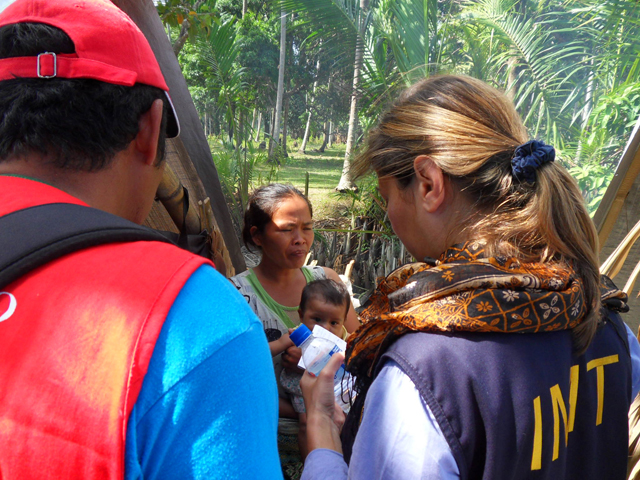
SAMSUNG DIGITAL CAMERA
The Advanced Practitioner’s handbook on Commissions of Inquiry was presented in November 2015 in an event hosted in coordination with the AU in Addis Ababa and in December as a side event to the International Conference of the Red Cross and Red Crescent in Geneva. Cynthia Petrigh from Beyond peace also spoke as a panelist at an event hosted by the Swiss Government at the UN HQ, which was attended by member states and representatives from the UN agencies. The conference discussed dilemmas surrounding mandate interpretation, applicable legal lenses, witness protection and public communication.
Organised by the Hague Institute for Global Justice and the Harvard Program on Humanitarian Policy and Conflict Research (HPCR) allowed for an interactive and interesting discussion with hand-picked practitioners, trainers, and policymakers engaged in investigative efforts in the domain of international criminal law, international humanitarian law, and human rights, on the development of methodologies and approaches for surmounting common challenges in recent fact-finding practices.
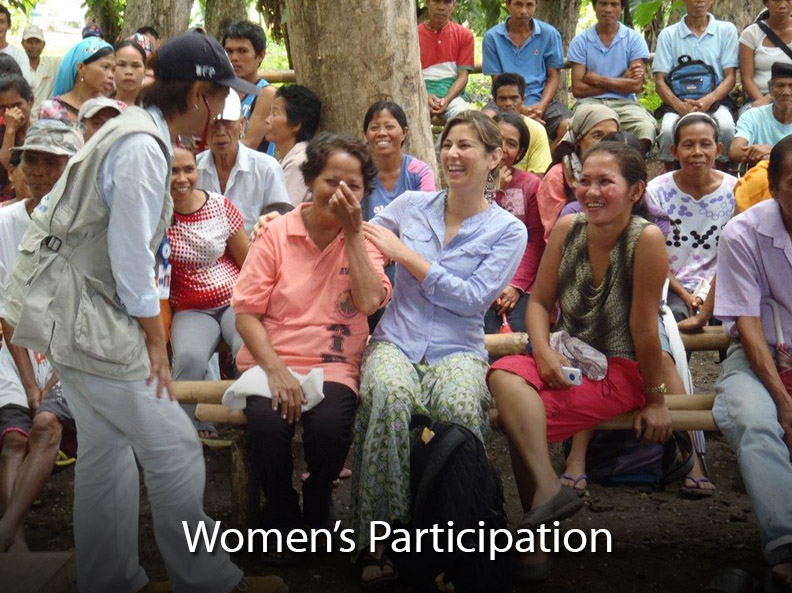
by Cynthia Petrigh | May 18, 2017
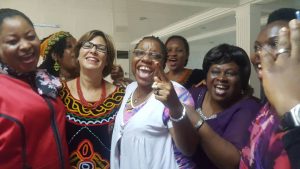
We support efforts to increase women’s participation in peace building, through advocacy, direct support to dialogue processes and by building women’s capacities.
« Nothing about us without us »
All of our programmes have a gendered approach. They include specific content on Women, Peace and Security and on the Prevention of Sexual Violence where relevant. We work with women’s groups to support their participation in peace processes; we train combatants on the prevention of sexual violence; we provide a gendered conflict analysis.
Recent stories from the field
In Guinea, efforts to increase women networks’ visibility and skills have been successful. Between others we supported the launch of Guinea’s Chapter of the African Women Leaders Network in 2023.
——-
Why and how support women’s participation?
May 2019
When I arrived in Cameroon in August 2018, women, as in many African countries, were very visible at work, in the shops, in the families, keeping together a country plagued by corruption, violence, weak governance and outdated patriarchal institutions. But they were invisible from the political arena. Even at the Ministry for Women’s empowerment, my interlocutor was a man. At the UN Women where I worked, the discourse was about protecting “women and children”, pushing women in the same category as children, into one group of victims deprived of any form of agency, objects of our assistance. I felt that the objective was not to transform the outdated, patriarchal and corrupt institutions; but to please the government and seduce the donors. Merely talking about the anglophone crisis was taboo.
The causes of the anglophone crisis include discrimination, perceived lack of opportunities but also the arrogance from the Centre. The initial, non-violent claims by anglophone lawyers and teachers was met with contempt and repression. At the UN, we organised our meetings with civil society in Yaounde, not in the conflict-affected Northwest and Southwest regions. How were we to know who is doing a real job on the ground? I wanted to show respect and go and listen to the anglophone women in their turf and in their own terms. In spite of warnings from the top UN peace adviser (“You can be kicked out of the country; there’s not much to see/do in Buea anyway; if I was you I wouldn’t go”), I travelled to Buea.
On my way, I stopped in Douala where I met with Cardinal Tumi, the Lead Convenor of the Anglophone conference, the only peace initiative on the table. We had a long discussion. He spoke of the upcoming Conference. I asked him: “Should only men represent the anglophone point of view?” He marked a pause. After a few minutes he admitted: “It never came up; we never thought of it”. During that initial meeting, he accepted to include women and put me in touch with Conference organiser Dr Simon Munzu. “You have great women”, was my line. “They are not coming to clap. They will have something to say. If you accept this, we will do our share; we will prepare them”. They accepted. I travelled to Buea with these good news in my pocket.
There, I met wonderful, skilful, courageous and articulate women. All women present were civil society leaders, and most of them had elected to join their efforts under a new umbrella organisation, the South West/North West Women’s Task Force -SNWOT. I was impressed by all of them, particularly the SNWOT leader Esther Njomo Omam Njomo. This was the week preceding the pre-electoral shutdown announced by the armed groups. And here, these women, most of whom were hosting IDPs and had to organise reserves for the coming days, had braved the security situation, had put aside their very real daily worries, and came to the meeting I had called for. That meant high commitment, and it also meant respect for the international institutions. Oh God! I hoped we wouldn’t fail them.
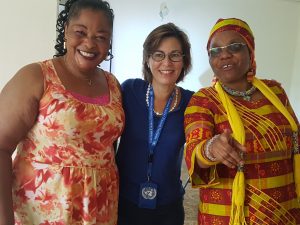
With the women in Buea on 19 September 2018.
They gave me a very good briefing on what was going on in the conflict-affected area. I realised that they were the women who can change the paradigm in Cameroon. They had the energy, the deep understanding of the crisis and the courage. When I told them that they were going to participate in the Anglophone Conference, they were thrilled. “We didn’t know we could join” they said. I was appalled to see once more that very capable women didn’t feel they were authorised to contribute. We agreed to work together to prepare their participation.
My intention (and my mission with the UN Women) was to make women count in peace and security issues in Cameroon, beyond this conference. My approach was three-pronged:
- advocate for their participation in any decision concerning the country (with the authorities, the Convenors of the anglophone conference, the diplomats in Yaounde, the UN etc). Bring to Cameroon women with high visibility like Nobel Prize winner Leymah Gbowee or negotiators from the Northern Ireland conflict, to showcase the added-value of women’s contributions.
- provide them with technical skills (on peace processes, mediation, agenda-drafting, comparative learning) so they could make more effective contributions to these fora
- give them visibility (bring them along to high level meetings, have them invited to regional or international fora)
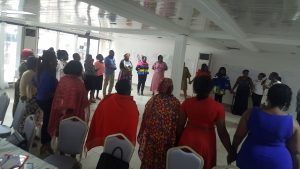
A lot of good energy and sharing during the Douala workshop in November 2018. Experts Agus Wandi and Webster Zambara joined me to co-facilitate. It was a very successful event.
This plan worked brilliantly because:
– These women were competent and dedicated and they had a true leader who helped us organise complicated events in a difficult political environment
– They had their own disagreements, but unlike most of their male counterparts who were obsessed with power and personal gains, they were happy to discuss the core issues and look for solutions to the crisis
– They just needed someone to believe in them and that was my role. My status of a consultant protected me in a way, because I could take risks
– I had by then built a solid network of contacts and many allies and friends helped me. We also benefited from a context where most donors and diplomats lacked ideas and initiatives about this crisis and we filled the vacuum. SNWOT became the only show in town. They supported us.
The Anglophone Conference was not authorised by the government. But Esther and her group did not need anymore an invitation. During a workshop I organised for them, they established a plan of action and they started running their own activities. In a very daring move, they successfully organised a press Conference in Yaounde, the Centre of power. They articulated their own agenda.
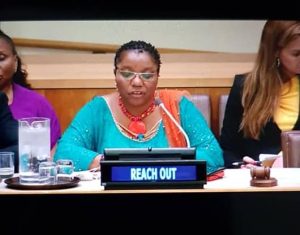
Today, 14 May, Esther Njomo the Reach Out Director and SNWOT leader gave a briefing to the UN Security Council on the humanitarian situation in the Northwest and Southwest regions of Cameroon (to watch the briefing: https://www.youtube.com/watch?v=2gkBht8pWSU)
True to her own self, she did not make it a personal victory. “I am here to talk on behalf of those women, mothers, wives, sisters, and daughters who have lost it all to the crisis. Those who are trapped in the bushes, in the forests because they lost everything they could hold onto”, she said.
At the end of her very precise and compelling speech, she launched an appeal for the cessation of hostilities and for dialogue.
“ It is time for us to silencing the guns
It is time for us to start talking”
What are the lessons from this story?
Lesson #1: If you believe in women and give them a chance, you won’t be disappointed.
Lesson #2: you only risk a career move, they are risking their lives daily. Be courageous!
Lesson #3: We need to improve the protection of women human rights defenders.
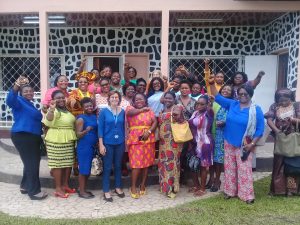
The first meeting in Buea, w


































